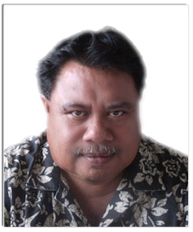DIRECTOR’S VOICE
Greetings and Welcome Aboard!
Perhaps at this time you are familiar with the location of the FSM Fisheries and Maritime Institute (FSM FMI, or FMI) and the programs that it offers. May be you already know that students at FSM FMI do not receive the U.S. DOE financial aid awards nor any direct funding from anywhere. The only money that FMI students receive is the meager amount being appropriated by FSM Congress each year and got distributed to all schools and colleges where FSM students are studying. The amount that is received by each institution is divided among all the FSM students studying at that institution. FMI students are lucky to have each received a portion of this appropriation every semester.
And perhaps you may already know that any FSM student accepted into FMI is given a transfer ticket to go to Yap at FMI, and to go back home after completing his two years of study. He does not pay for the tuition, including his board and lodging at the Institute. The items for which the FSM student will pay are for registration, his insurance (per semester) and uniform.
The three programs that are being offered at FMI, which include Navigation, Marine Engineering and Fishing Technology, are not very popular among today’s youth in Micronesia, as we can tell from the still low annual enrollment we are experiencing despite the fact that we have been around for a decade. For example, enrollment in 2007 was 32; 2008 was 28; and 2009 was 37. In responding to this situation, however, several measures are being taken to improve these programs and introduce related programs that although could be supportive of the existing ones, are stand-alone programs that would make these programs more attractive.
Through time, we have learned to try to bring into line parts of the programs that we think could make the current programs much easier for students to learn. Because of the lack of applicants, Fishing Technology had always been obscured by Navigation and Marine Engineering and became like a Minor or an Elective. During Spring 2010, it was decided that Fishing Technology be coming out of its obscurity and stand out as a program. Courses will be taken from other related programs to complete its technical requirements, while intended courses will eventually be developed. It has been suggested that a second fishing instructor be hired to strengthen the program.
There are courses with sections which could offer better courses if they were to be developed further and improved in order to be made into full courses. Some of these have already been developed and are now being scrutinized by the Curriculum Committee before its final action. Still others are in the making. There are courses being offered at other campuses which could fit in nicely within our programs to be made their core requirements and those are being sought after for clearance and approval.
The Student Services Coordinator, who is also the Acting Instructional Coordinator (AIC), has yet to complete the assessment of all the courses that are offered for the two-year cycle of the programs. He has completed the short safety courses, the watchkeeping courses for ratings (deck and engine), and is currently working on the Class 6 courses. The Class 5 courses will be taken up following the Class 6 courses, which will be the whole second semester of 2011. Course reassessment then would be fairly easy and straight forward, making corrections even much easier. This would make it even much easier for the students to follow their plan of study for their chosen major.
The AIC has completed the evaluation of all the instructors, and is now looking at ways to make instruction more effective. He is pushing for all the instructional positions to be filled prior to Fall 2010 (currently, there is one Engineering Instructor vacancy), and, as is earlier indicated, he is recommending for a fishing instructor’s position to be created.
We are constituting an advisory council to assist the FMI administration charting the way forward for the Institute. We feel that directing the course of the Institute should not be left to the school alone. It should have the assistance of people within the industry who are familiar with the needs, progress and development within the industry. It should have people from the public and private sectors whose eyes are on development and are willing and able to assist in development of courses and their amalgamation and alignment with socio-economic needs and development of this country. And it should have the involvement of citizens who would keep the balance between development and environment.
We think that with the few changes that we are contemplating for the Institute, we hope to see improvements of programs and services, our fulfillment and satisfaction in our ability to make improvements, and our determination to continue to improve upon improvements in order to make the Institute the choice for technical studies.
Thank you.
Kammagar.
Kinisou Chapur.
Mennlau.
Kulo.

